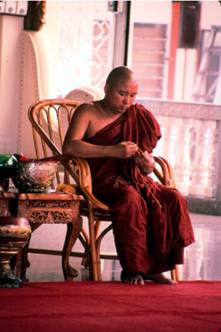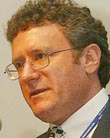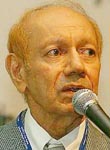
At the First Malaysian Conference on Anti-Aging Medicine held recently in Kuala Lumpur, doctors and scientists defined the role of anti-ageing medicine in society, writes Colin Khoo.
The elixir of youth is something that is often referred to in tales. It allows the hero and heroine to live happily ever after, not as old folks, but as people who continue to be blond and beautiful.
Sadly, no such elixir exists in real life. However, there has been continuous advancement in the field of anti-ageing medicine - a holistic approach to the problems of aging.
In Malaysia, life expectancy has increased from 55.8 years in 1957 to 70 years, for men, and 75 years, for women.
The World Health Organisation estimates that by the year 2025, the world population would reach eight billion. By then, it is estimated that 800 million people would be 65-years-old and above - which comes to about one in every 10 people. As the aging population increases, anti-ageing medicine would come to play a vital role in maintaining the wellbeing of modern society and eradicating the debilitating and disabling diseases of aging.
At the First Malaysian Conference on Anti Aging Medicine, held recently in Kuala Lumpur, some 200 medical specialists and scientists from the US, Germany, Singapore, Australia and Malaysia presented their views and expertise on the many aspects of anti-ageing medicine. In essence, they defined the role that anti-ageing medicine plays, or should play, in a society.
It was highlighted that for the aged population to get the best of their golden years, rapid adoption of safe and effective diagnostic and treatment processes (that can improve the quality of life in these golden years) is a critical imperative.
"Anti-ageing medicine is a medical specialty founded on the application of advanced scientific and medical technologies for the early detection, prevention, treatment and reversal of age-related dysfunction, disorders and diseases. It is a healthcare model promoting innovative science and research to prolong the healthy lifespan in humans.
"As such, anti-ageing medicine is based on principles of sound and responsible medical care that are consistent with those applied in other preventive health specialties," says Dr Robert Goldman, Chairman of the American Academy of Anti-Aging Medicine, who was at the conference.

Dr Robert Goldman...'A multi-modal, multi-therapeutic approach may deliver greater health effects.'
In short, anti-ageing medicine is a comprehensive discipline that looks at all aspects of health care. It focuses on things such as detection screening, nutrition monitoring and education and risk factor management.

Datuk Dr S Harnam...'The old paradigm of healthcare treats the symptoms and not the cause.'
Consultant ENT surgeon and president of the Society for Anti-Aging Medicine Malaysia, Dauk Dr S Harnam says: "The distinct goals of anti-ageing medicine are to increase life-expectancy and to promote optimal health and wellness as we age and to treat and manage the chronic diseases associated with unhealthy aging. Aging occurs throughout the body - as a person ages, his heart rate decreases, his blood vessels reduces in diameter, his skin losses collagen and his nerves and joints degenerate. The old paradigm of health care treats the symptoms and not the cause. Furthermore, gerontology - which regards aging as inevitable, natural and unavoidable - does not offer any hope. Anti-ageing medicine is thus a new specialty in medicine and it uses current technology to identify the multiple phases of aging to enable early detection and prevention of diseases."
Anti-ageing medicine though should not be thought of as a specific sort of medicine or treatment. In fact, any programme committed towards improving the health of elderly folks can rightly be called anti-ageing medicine.
The term, as used by medical practitioners, covers all aspects of health care. Thus, a move towards a healthier lifestyle (though it might not require any medication or treatment) is an aspect of anti-ageing medicine.
"Anti-ageing medicine recognizes that often, a multi-modal, multi-therapeutic approach - including nutritional supplements - may deliver greater health effects than administering single therapies alone. It is also holistic; it utilizes an organized framework for the head to toe assessment and subsequent design of a treatment regimen," says Dr Goldman.
To what extent, though, is anti-ageing medicine present and available in Malaysia? Do physicians and health care providers in this country, for instance, provide such a broad range of services to elderly folks?
Says Datuk Dr Narimah Awin, the Health Ministry's Director of Family Health Development: "In the healthcare sector, many initiatives have been instituted. A health service for older people provided by the Health Ministry encompasses health promotion, disease prevention, curative care for illnesses and rehabilitation. At primary care levels, elderly care is one of the expanded services in primary health care, and almost all of the 852 clinics have carried out some components of care for older persons. Training of staff using several modules is an ongoing activity."
What, though, about secondary care?
"Secondary care at hospitals is an essential component, and hospitals are required to be "elderly friendly". A few hospitals have begun geriatrics as a specialty service, but needless to say, management of older ill people requires a multi-disciplinary approach? Geriatrics, after all, is not a practice in isolation.
"Rehabilitative services can be found at hospital level, but it is also decentralised and provided by primary clinics and ambulatory care centres. Home care is another option and this is being implemented on an incremental basis by the Health Ministry, although NGO's and the private sector are encouraged to complement such services," Dr Awin explains.



